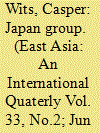|
|
|
Sort Order |
|
|
|
Items / Page
|
|
|
|
|
|
|
| Srl | Item |
| 1 |
ID:
174132


|
|
|
|
|
| Summary/Abstract |
This article examines the importance of the exchange of foreign correspondents between Japan and China from 1964, during a period of the Cold War when the two countries did not have official ties. Favourable political circumstances in the first half of the 1960s led to a brief window of opportunity for an improved relationship between China and Japan, during which this unique exchange took place. The article attempts to shed light on the significance of the exchange within the broader context of Chinese foreign policy and Sino-Japanese relations during the Cold War. Thereby it will clarify the importance of the 1960–1964 period for the longer rapprochement process that would come to fruition in 1972 with the establishment of diplomatic relations. The exchanges of 1964 were seen by participants as an important first step on the way towards official ties. For the Chinese the importance of a relationship with Japan in this period, and, by extension, the importance of the journalist exchange, is shown by the involvement of an unusually high number of journalists from both countries. This article argues that the Chinese leadership's desire for the journalist exchange was rooted in a craving for accurate knowledge about Japan, especially concerning specific political trends and economic developments. This enthusiasm was matched by pro-China politicians in Japan, who also felt that the journalists’ presence would enable the Chinese to base their Japan policy on a broader variety of sources, extending beyond information merely gathered through contacts in the Japanese left.
|
|
|
|
|
|
|
|
|
|
|
|
|
|
|
|
| 2 |
ID:
145660


|
|
|
|
|
| Summary/Abstract |
In the new Cold War context of the early 1950s, when the People’s Republic of China and Japan had no official relations, Chinese Premier Zhou Enlai developed his so called People’s Diplomacy; a strategy of creating informal channels between China and Japan that could serve to build a network of personal ties outside the immediate government sphere, ties that would ideally become so strong they would result in official diplomatic relations. A central position in this strategy was reserved for the Japan Group; an unofficial network drawn from different foreign policy organs, centered on Zhou Enlai’s close confidant Liao Chengzhi, which was to manage Zhou’s Japan policy. This group, many of whom had a background in intelligence work, was charged with training the Chinese government’s Japan specialists, managing all interactions with Japanese, as well as with actively cultivating ties with a wide variety of Japanese, especially outside of Japanese leftist circles. This article traces the establishment and inner workings of the Japan Group in the 1950s, based on published records of, and interviews with, group members. The main focus is on the core of the group, made up of a small number of trusted Japan hands around Liao Chengzhi. Since this same core group of people was involved in all interaction with Japanese, they provided the continuity necessary for cultivating the informal personal ties that had to lead to the long-term goal of Sino-Japanese rapprochement. This networking process, which transcended the immediate concerns of particular negotiations and exchanges, will also be explored.
|
|
|
|
|
|
|
|
|
|
|
|
|
|
|
|
|
|
|
|
|